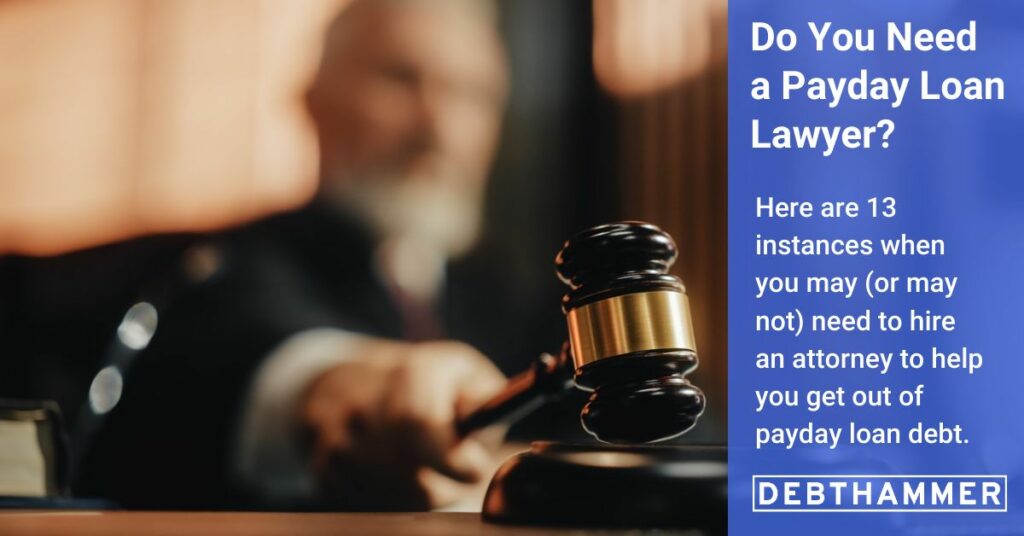If you are overwhelmed with a large amount of payday loan debt, you might be wondering whether you need a payday loan lawyer. It depends on whether your legal rights have been violated. Here’s how to figure that out.
Table of Contents
You may not need a payday loan attorney
Lawyers are expensive. If your problem stems from the inability to repay a $500 loan, lawyer fees will probably be overwhelming. If you’re dealing with a routine situation, like debt collector calls or a potential lawsuit over an unpaid payday loan, you probably don’t need a lawyer. You have the right to resolve these situations on your own.
In fact, most loan default lawsuit cases don’t involve legal representation. You simply need to appear in court to present evidence of your financial hardship. In small claims court, neither party typically brings legal representation.
Stuck in payday debt?
DebtHammer may be able to help.
Disclaimer: The contents of this article are for informational purposes only and should not be construed as legal advice.
Should you hire a lawyer to help with payday loans?
Hiring an attorney will depend on the complexity of your circumstances, how much you owe, and if you are starting to get harassing calls from lenders. The more complicated the situation, the more likely you will need an attorney.
1. You’re having problems with collection calls: No
Debt collectors are required by law to stop contacting you as long as you send them a written request. You can do this on your own for about $10 in printing and postage costs (you need to pay extra for a return receipt to ensure that the debt collector received your letter.) Save your receipts. If the debt collector continues to call you, you can threaten them with a lawsuit, and that’s the point where you should consider consulting a lawyer.
READ MORE: How to deal with debt collectors when you can’t pay
2. You need help understanding your legal options: Yes
Lawyers specialize in the laws of the state in which they practice, and each state has different payday loan laws. This includes rate caps, statutes of limitations and any other specialized rules your state may have for payday lenders. If you aren’t sure whether your loan was legal in your state, or you suspect a lender or debt collector has violated your rights under the Fair Debt Collection Practices Act, you should talk to a lawyer.
3. You want to try debt settlement: No
If you’re a good negotiator, you don’t need to hire an attorney to try your hand at debt settlement. You can contact your lender and negotiate a settlement on your own. If you have more than $1,000 in payday loan debt, a payday loan relief company will be able to get you a settlement at a lower total cost than a typical attorney would charge, and any company you hire will know your state’s laws.
READ MORE: Is debt settlement a good idea?
4. Your lender has threatened legal action against you: Maybe
If the lender decides to sue you, your attorney has the authority to speak with your lender to try to negotiate out of court. It is your attorney’s job to provide negotiation assistance. However, you can do this on your own, or in many cases, hiring a payday loan debt relief company will typically stop any immediate legal action.
5. You need legal advice: Yes
The advantage of using an attorney is that they will explore all the options with you. They will tell you if bankruptcy is the best option and can then handle your bankruptcy case.
6. You suspect a state law has been broken: Yes
Each state has different payday loan laws. Your payday loan attorney will be an expert in those laws and know how to guide you accordingly.
READ MORE: States where payday loans are illegal
7. You need advice about how to handle your loan: Maybe
Payday loan lawyers have probably done hundreds of similar cases like yours and can easily anticipate the possible outcomes. However, the same can be said for payday loan relief companies. Your best first step is to schedule a free consultation with a debt relief company. That company will tell you if your situation is complicated enough that you need to consult an attorney.
8. You’re trying to wait out your state’s statute of limitations on debt: Yes
The statute of limitations will depend on the loan type and state it originated from. Since the clock starts when you miss a payment, an attorney will know exactly when the lender can no longer sue you to collect the debt and can advise you on steps you need to take so that you don’t reset the clock on your debt.
9. You suspect that your consumer rights have been violated: Yes
If you think the lender may have violated any lending laws, check the Consumer Financial Protection Bureau (CFPB) and Federal Trade Commission (FTC) sites for laws that protect you, then contact an attorney. Common violations include identity theft or misuse of personal information. You could have a case against them.
Pro tip: In this instance, you may be able to get free legal advice from your state attorney general’s office.
10. You have $500 or less in payday loan debt: Probably not
In this case, your legal fees will likely be more than your payday loan debt. Your best bet would be to contact your lender and try to negotiate a settlement or payment plan.
11. You’ve already received a court summons: Probably not
If you’ve gotten a court summons, do not ignore it. Be sure to attend your scheduled court appearance. If your lender wins through a default judgment because you didn’t show up, they can ask the judge to garnish your wages, take money out of your bank account or even seize your personal property.
However, you can represent yourself in small claims court. All you need to do is present evidence about why you’re unable to repay the loan. If it makes you feel more comfortable, a lawyer can review your rights and advocate on your behalf in court, but in the case of payday loans, you’d probably end up having to pay the lawyer more than the debt you owe.
12. You are seriously considering filing for bankruptcy: Yes
If you are considering bankruptcy, it should be because you have tried everything else to get yourself on the right track financially and cannot pay your creditors back. Bankruptcy fees add up, so before you file, make sure that the cost of bankruptcy isn’t higher than the amount you owe.
Seek legal advice before you proceed.
There are two types of consumer bankruptcy: Chapter 7 and Chapter 13. Each type has different requirements and costs. A lawyer will know which type of bankruptcy will work for you and will be able to help you navigate the process. Bankruptcy law is complicated. Do your due diligence to find a competent attorney who is knowledgeable about bankruptcy codes in your state.
13. You’re at risk of foreclosure: Yes
This goes beyond payday loan debt. If your payday loans cause you to fall behind on your mortgage payments, you will most likely lose the home. A mortgage is a secured debt, so filing for Chapter 7 bankruptcy won’t wipe this out and doesn’t allow you to catch up on late payments, but it will temporarily halt foreclosure for a few months.
Payday loan attorneys charge fees
Many law firms offer a free consultation, but after that, fees can add up quickly. If your debts are less than $1,000, you will be better off dealing with it on your own. You have a few different options.
If your debts are more than $1,000, a payday loan debt relief program may be less expensive than an attorney. You typically pay a fee ranging from 15% to 27%, but you will still likely end up repaying less than the full amount you owe, while also avoiding legal problems.
Pro tip: There are Legal Aid programs and law firms that do pro-bono work (free services), but you’ll need to find firms that offer this option and be able to show proof of financial hardship. The American Bar Association has compiled a searchable database.
If you need to consult an attorney, meet them in-person in their law office. Ensure that you’re comfortable discussing confidential details about your financial situation.
While on-site, it’s easier to discuss and assess the fees you’ll need to pay. Do they charge one lump sum to represent you, or will you have to pay an hourly fee? Before making an appointment, review the attorney’s experiences, reviews, and history to ensure they are the right fit for your case.
Seven more times to consult a payday loan lawyer
Payday loans are relatively simple, but if you cannot repay the lender by your next paycheck, it can lead to more loans, penalty fees, and even a lawsuit. Some common legal conflicts include:
- Your interest rates exceed your state’s rate cap
- You have a payday loan in a state where payday loans are illegal
- You’re involved in a dispute over loan terms
- There’s been a breach of the lending contract
- You’re disputing service fees
- You believe your lender issued a fraudulent loan or you’re the victim of a fraud
- Your lender illegally used loan documents that are commonly associated with identity theft
READ MORE: Is not repaying your payday loan a felony?
How to solve payday loan disputes on your own
If you’ve defaulted on a payday loan, there’s no need to panic. There are specific steps you can take to resolve this dispute.
- Repay the loan: The simplest one is to pay back the loan. Paying the loan back ends the process and disputes immediately. It may be a cheaper alternative to hiring an attorney.
- Apply for a Payday Alternative Loan: Federal credit unions offer these loans as a better alternative to payday loans, except you can borrow up to $2,000 and pay it off over time.
READ MORE: Will I go to jail for an unpaid payday loan?
The dangers of the payday loan debt trap
Payday loans are short-term loans with high interest rates. They help cover immediate cash needs until your next paycheck. Because of payday lenders’ predatory nature, high interest rates (some over 600%) and additional fees, these loans are outlawed in some states, and repayment by the next payday is difficult for many borrowers.
About 80% of payday loan borrowers can’t afford to repay their original loan on the due date and end up rolling their loan into a new loan with new fees. This starts a cycle of borrowing that’s difficult to escape and is commonly referred to as the payday loan cycle of debt.
More than 90% of borrowers regret taking out a payday loan.
Other options for debt relief
Here are some more affordable options before turning to a law firm.
- Debt settlement
- Debt consolidation
- Take on a side gig
- Borrow from friends and family
- Peer-to-peer lending
- Debt Management Plan
- Credit counseling
READ MORE: Easy, straightforward payday loan relief
The bottom line
When you are drowning in debt, it’s easy to get overwhelmed by unpaid payday loans, particularly if you’ve been threatened with a lawsuit. But while ending up in court is a very real prospect, you don’t necessarily need to hire a payday loan attorney, particularly if a simple remedy will suffice.
If you need help with $1,000 or more in unpaid payday loans, DebtHammer can help. Contact us today to set up a free consultation.


